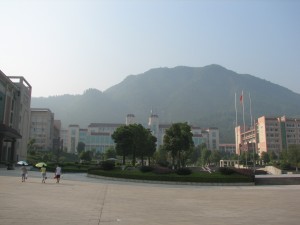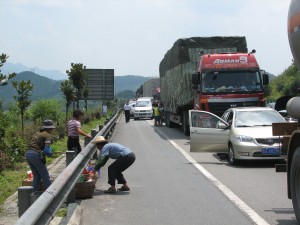Of Fried Chicken Feet
Well… I’m here.
“You must act like you are at home. Please tell me if you experience any inconvenience.â€
These were the words of Mr. Bob Chen—his words a constant refrain throughout our first hours together. Bob was a small, thin man wearing a short sleeve dress shirt tucked into slacks. He took my fully loaded backpack away from me—if he was a contortionist he would be able to fit inside it; pack being about half his weight. He was small, but I knew his heart was big.
A couple days in country… How can I sum it all up? China was dirty, hot, loud, and bustling. The people were beautiful, industrious, and eager to please. The land was rugged. Green hills like dragon’s teeth corralled the roads and towns. It was hot and hazy. The people shy. They wavered between gawking and hiding their eyes—but their eyes lit up and they smiled when I said hello in Chinese, “Ni hao.â€
Meanwhile, my contacts struggled to express themselves, make me comfortable, and request my patience with all the inconvenience they were causing me. But I was causing them inconvenience I told them back. We went back and forth apologizing to each other until finally the apologies canceled out and we moved forward to more important things like exchanging money at the Bank of China, getting a cell phone, and going to Wal Mart.
It’s been a couple days since finding myself in a spacious dormitory-style apartment at Xiangnan University in Chenzhou, Hunan. Pronunciation of the university’s name was still a mystery despite several the best attempts of my hosts.
Buyer’s remorse was setting in.
I spent all day Saturday in bed sleeping and wondering what the hell I had been thinking of coming to China in the first place. It had only been 48 hours in Chenzhou. Facebook and Twitter were blocked. I felt isolated. How would I be able to stalk all my friends? I was also jet lagged and worried about finding cleaning supplies. What a man would do for a good bottle of bleach. Plus I was worried about bugs. The day before, on my way to my new home from the airport, I had read an article about bed bugs on the way to Chenzhou from Guangzhou—it was in an English language newspaper that Sail had brought with her for my reading pleasure—on the offhand chance we hit a traffic jam and I got bored. And now Wal Mart was over thirty minutes away and required a taxi or bus ride–which in turn required experience and knowledge. Both of which I lacked. Goodbye self-reliance. And just going outside meant sweat, dirt, and stares; clothes plastered to my body, sweat poured out of my forehead, and everybody looking at the sweaty foreigner.
That late afternoon thunder rolled across valley, alternating between languid rumbles and boisterous cracks that exploded and gradually subsided to whimpers. It was an ominous tropical thunder without rain or lightning.
The flight to China was better than actually being in China. During the plane ride, China was still magical, clean, and dreamlike. Now, China was rough, dirty, and all too real.
But I am getting ahead of myself.
Enter the Dragon
I arrived in Guangzhou Thursday evening. It had been a 24 hour flight including layovers in Chicago and Tokyo. It was a miracle there were no delays, and there was plenty of food, beverages, and space; I sat with another man in a three seat section. There were movies, clean bathrooms, and beautiful smiling stewardesses who handed out hot, damp wash clothes with tongs from wicker baskets. There was tea service. There were toothbrushes and mouthwash. There were more bathrooms per capita than anywhere else in the world. Needless to say, I was not on an American airline. And then I arrived in Guangzhou where uniformed guards and officers wearing surgical masks motioned travelers through the threshold between the worlds. They did not even ask me to take my shoes off. I stood in a three person line to get my passport stamped and then I was on my merry way. Exiting America was a nightmare that needs no elaboration. Entering China was painless, quick, and easy. I didn’t know whether to laugh or cry.
That’s when I met Bob and Sail. They whisked me away to hotel where I fell into a deep sleep after 24 hours of staying awake, too excited to finally go to China, reading the books I will teach, and day dreaming about how it’s all gonna be.
Bob, Sail, and another person—the only one amongst us with a Chinese driver’s license (Bob: “He is the driver of the president of the universityâ€)—and I went to breakfast. We sauntered through a loud room of men smoking and eating and into a private room with no windows where a waitress brought us a cart full of steaming wicker baskets. My hosts spoke to the waitress and she put some dishes on the the table. Everything was a mystery. Dish after dish was placed on a Lazy Susan—a revolving turntable in the center of the table—from which each plate of food can be passed around. We jabbed our chopsticks into each plate. The food kept coming. I placed my faith in my immunity and vaccinations.
It was hard to tell what I was eating. The food bore no resemblance to its origin. But I wielded my chopsticks with courage to the compliments of my hosts. I grabbed some doughy, greasy clump of food. It tasted good, but I had no idea what I had just eaten. Everything was bland or sweet. But I was in Gaungzhou—notorious for its loose definition of food: If it moves its food. Furthermore, the food was blanketed or secreted in a ball of dough or chopped up into something unrecognizable. You would have no idea what you were eating until it was in your mouth and your teeth came down upon something soft or crunchy, your tongue tasting something bland, sweet, or strange. Dumplings hid clumps of matter that may or may not have been vegetable or animal in origin. Everybody seemed to eat fast. For the first time in my life, I had become a slow eater, and was the first to stop eating. I thought I was finished. My appetite was long gone. Meanwhile everybody eat with relish. They made chewing sounds. It sounded like they were eating with their mouths open, but I thought it would be too impolite to confirm this by sight.
And then Bob said, “Try this.†He pointed at a dish containing something my eyes had neglected to spot earlier. It looked like fried mutant squid with three tentacles and doused in red cough syrup. I pecked at it with my chopsticks, and used all my powers of rationalization to think that perhaps some fresh seafood in sweet and sour sauce for breakfast would be a news to write home about—you and your yogurt and oatmeal, me and my squid cereal.
“What is it?†I asked.
“Fried chicken foot,†said Bob. He stuffed a piece in his mouth and chewed happily.
“Okay.†I placed the fried chicken foot on my plate and helped myself to some egg noodles.
We drove to Chenzhou after breakfast was thankfully over.
We passed by rice paddies and great jagged hills. My hosts explained that we were on a famous Chinese expressway that ended in Beijing. It was a four lane highway: two lanes for either direction—three if you included the breakdown lane. Our driver used this latter to pass trucks on their left. The driver tapped his horn to let truckers know they were about to sidewall us. “This is a very famous expressway, but accidents are very common. Do you have expressways in America like this?†Bob said.
Sail pointed out various peasant villages, interesting landscapes, and Chinese signs that said things like: “Plant more trees for the good of the people.â€
Then all of a sudden traffic went from sparse to clotted. We came to a stop. Bob got out to investigate, saying something about a traffic jam. Traffic on the offer side of median sped by with an occasional cheerful horn honk. A half hour passed by. Then people came out of nowhere bearing baskets of snacks and beverages. They walked along the middle of the highway. A man in a truck chucked a paper bucket of chicken bones out of his window. Men, women, and children with baskets of food, pushing carts of steaming pots strolled down the middle of the highway between cars and trucks. They came up to our window to display the contents of their baskets.
I had no clue what was going on. Was this a Chinese tradition? Everybody stopping work and driving at about noon for a communal meal? A festive air ensued. Chatting women with umbrellas strolled by. Children ran around playing games. Men lit up cigarettes.
Inside our car, Sail hung up a newspaper in the window to shield herself from the sun and the driver turned up the air-condition. She had been cramming me full of Mandarin, teaching me the words for everything. I didn’t have the heart to tell her that between the long flight and the information overlaod that I would probably forget everything she told me. Bob came back to report there had been an accident and the police were telling everybody to please be patient for the next couple hours.
I decided to have a look for myself. An officer stood at parade rest. The road north beyond him was bare as it stretched around the corner of a hill. An endless line of cars, trucks and buses snaked to the south. Peasants from a nearby village took a break from their rice paddies to capitalize on the situation. They sold snacks and beverages.
Bob joined me at the guard railing. “This is unfortunate,†he said. “You are the first foreigner to experience this.†Ah, we Americans are famous for our pioneering spirit.
Finally, we all got back into our cars and drove on. We passed the cause of the halted traffic. A truck full of produce somehow managed to dump its contents onto the road. Everything had been moved to the margin so that traffic could continue. Workers frantically tossed the remnants into another truck. Everybody chuckled. And I was confused.
Little did I know that confusion would be a common theme for days to come.


